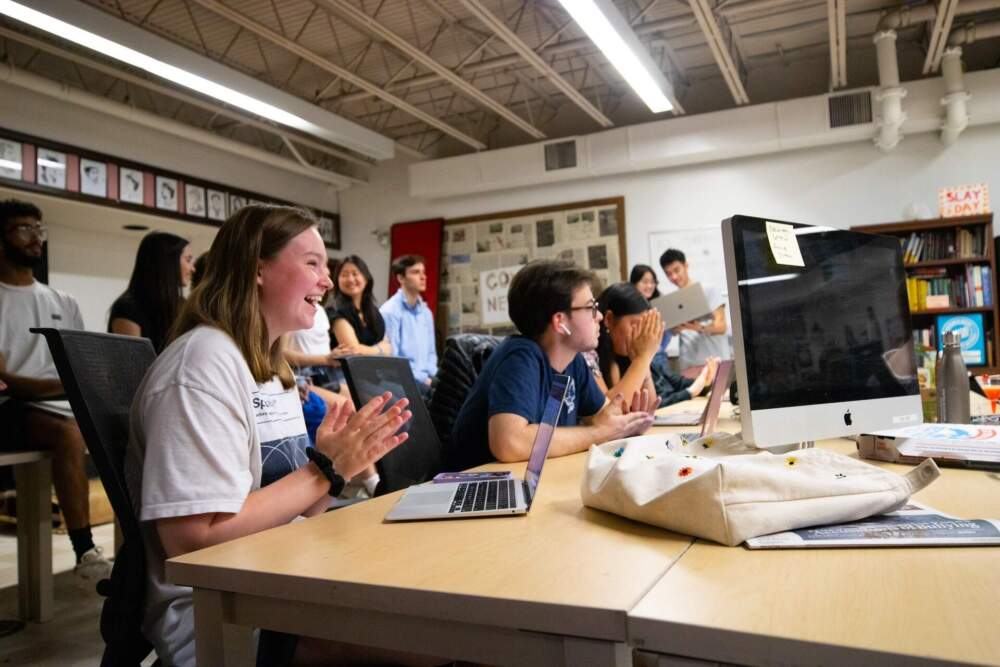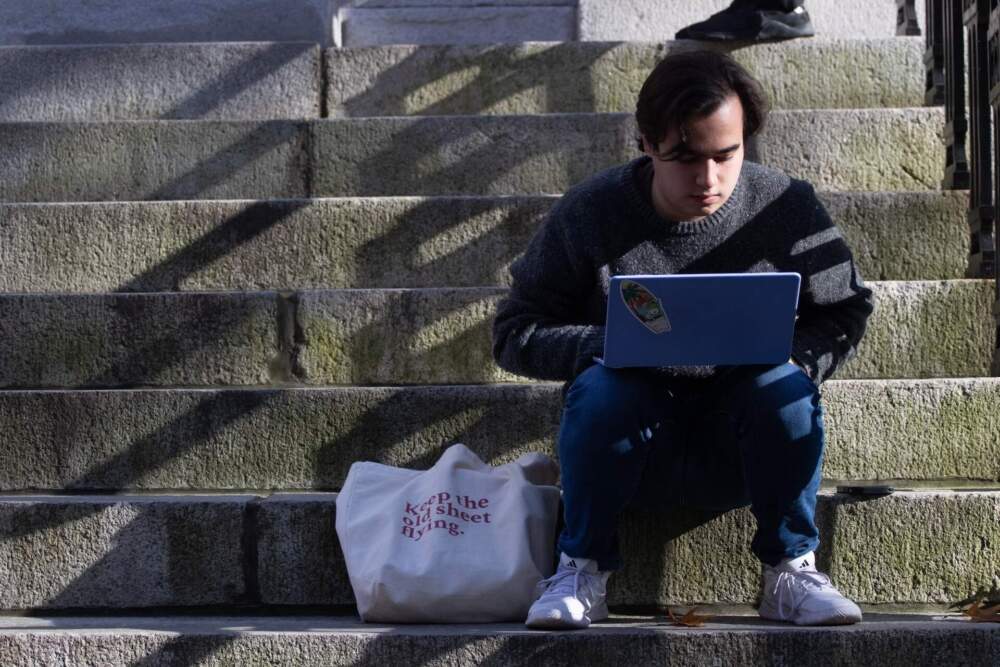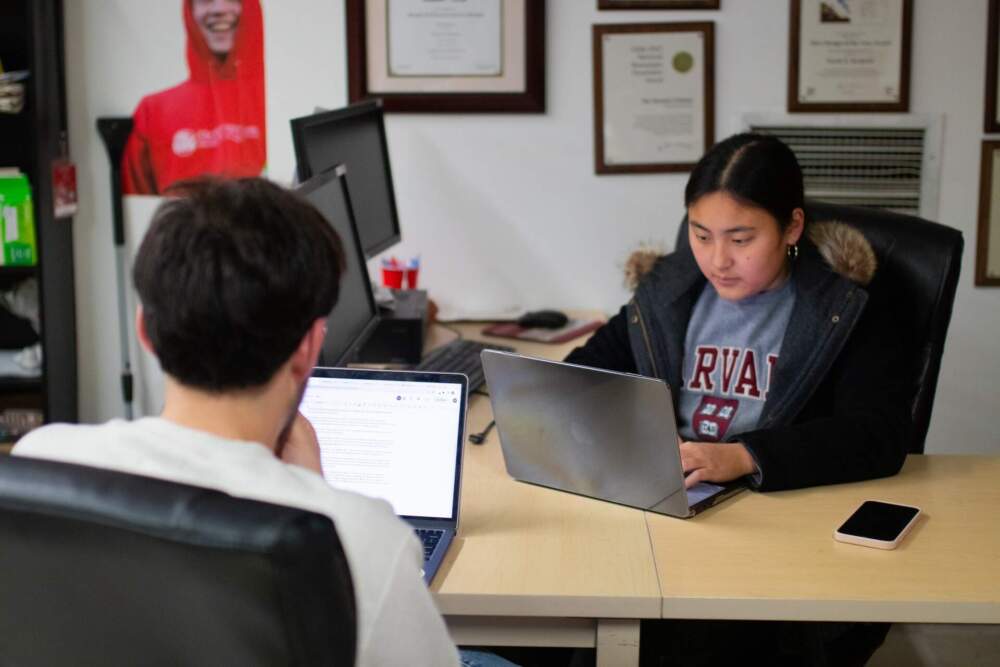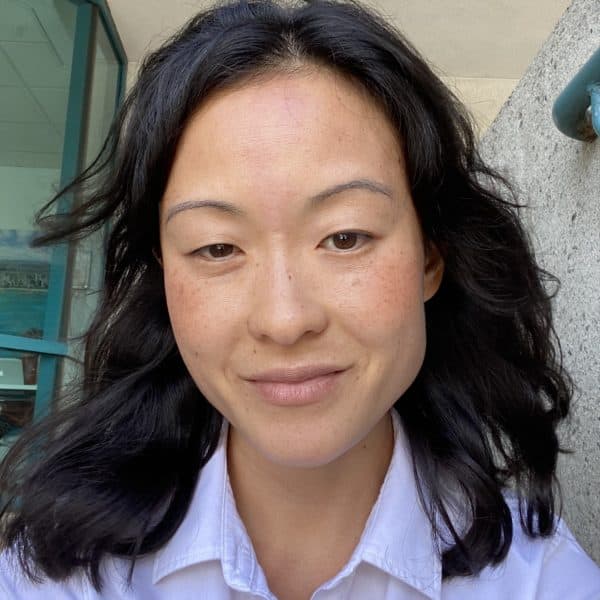Advertisement
How Harvard Crimson journalists delivered ‘indispensable’ coverage of the university’s leadership crisis
Resume
When the Harvard Crimson broke the story into one of the final chapters of Claudine Gay’s embattled tenure as Harvard president, most people were still asleep.
Crimson reporters Miles Herszenhorn and Claire Yuan, like many Harvard juniors, were up late at the university library, studying for finals.
They’d recently reported that the school’s two governing bodies convened on campus over the weekend to presumably discuss the evolving crisis since Gay’s congressional testimony on Dec. 5. Despite mounting calls for her removal, the university’s highest governing board — the Harvard Corporation — had yet to break its silence on the matter.
“We were very much knee deep in finals,” Yuan, 20, said. “We were still awake at some pretty obscene hours of the night trying to not only continue sourcing but also get some of our schoolwork done.”
That persistence paid off. Before the sun rose, Yuan and Herszenhorn learned from a source the Corporation would soon release a statement in support of Gay. At around 4 a.m., the reporters published their story to the Crimson’s news site and posted the scoop on X.
“We didn’t get a lot of sleep that night. It was a bit brutal, but it was worth it,” said Herszenhorn, 21. “It was really tough to think about anything else when we knew that [Gay’s] fate was currently being decided. So we kept trying to get the story.”
That mix of determination and depth of sourcing churned out a streak of exclusives on Harvard's leadership saga, with the Crimson scooping local and national publications again and again.
The eminent campus newspaper, which publishes online stories five days a week and a weekly print edition, is entirely student-run and editorially independent from the university. As a donations-based nonprofit, it is much more financially secure than most college newspapers. Many of its staffers spent their break working long hours — all in a volunteer, extracurricular capacity.

The Crimson’s breakthroughs were remarkable without even considering the competing demands of exams and winter recess, or how the young journalists might grapple with processing the fast-moving updates as students.
“What’s been going on at Harvard this past year — but especially since October — has definitely been, you know, surreal to live through,” said Elias Schisgall, a junior and co-associate managing editor of the Crimson. “It's a really intense and historic moment for Harvard, and I think that that's not lost on us as students in addition to being journalists.”
Gay, the university’s first Black and only second woman president in its nearly 400-year history, stepped down after just six months in office. Expected to lead Harvard for well over a decade, her selection by the Harvard Corporation after an abbreviated search was heralded as a triumph and watershed moment for the university.
But then, war abroad broke out. Gay soon faced a barrage of criticism for the university’s response to Hamas’ Oct. 7 attack on Israel and to a pro-Palestinian statement signed by campus groups. Tensions flared on campus. She and two fellow university presidents — from MIT and the University of Pennsylvania — were summoned to testify before U.S. Congress members.
A hostile, Republican-led panel battered the university leaders with questions about student speech and antisemitism. Gay faced rebuke after her exchange with Rep. Elise Stefanik, in which Gay repeatedly responded, “it depends on the context,” to Stefanik’s grilling of whether “calling for the genocide of Jews” violates Harvard policy.
Herszenhorn and Yuan, who were on the paper’s central administration beat since the start of Gay’s 185 days at the top, landed the first sit-down interview with the then-president after her congressional appearance. (Both students were since tapped for high-level editing roles: Herszenhorn as the paper’s managing editor, and Yuan as co-associate managing editor.)
It was after Gay apologized for her testimony that the focus on the Crimson’s reporting first sank in for Schisgall.
“The story that [Claire and Miles] published really got an incredible amount of attention and sort of sparked national headlines,” he said.
"We strive to be the go-to for people on campus, and I think that will always pay off."
Cam Kettles
From the outset of Gay’s brief leadership, Crimson staffers said they’ve stuck to tried-and-true journalism tenets — what Cam Kettles, 20, attributed to them coming out front with not just the resignation, but multiple firsts.
“We are always talking to people, and we are asking these questions constantly,” said Kettles, a sophomore and history and economics major. “And that is a benefit that we have — not just in these moments but in other instances throughout, really, her entire tenure.”
“We strive to be the go-to for people on campus, and I think that will always pay off.”
And as drama kept unfolding for Gay, the reporters kept with the story, parsing through rumors and adding fresh context to try to untangle what happened during closed-door meetings among university leadership.
On Dec. 26, Emma Haidar along with Kettles published a story countering parts of a New York Times’ story published two days before that revealed members of the Corporation had met for dinner in Cambridge in which one member had allegedly expressed wanting to replace Gay.
The Crimson also first reported that William Lee, a former senior fellow on the Corporation and well-known litigator, helped prepare Gay for her congressional testimony — which many criticized for sounding too legalistic. They further reported that the high-powered PR firm Harvard hired to manage the school’s crisis communications was sidelined as Gay was coached by Lee.
“We have a perspective as student journalists that nobody really else has,” said Herszenhorn, a history and literature, as well as Slavic languages and literatures, double-major. “People pay attention to Harvard nationally because it’s Harvard, but people started paying attention to the Crimson because our reporting was stuff nobody else had.”
Yuan, who’s a chemistry and physics plus history of science double-major, agreed.
“Our mission has always been to cover Harvard and its community and the surrounding area to the best of our ability,” she said. “It just so happens that this is a story and a topic that a lot of people beyond our typical audience really care about.”
And ultimately, while the Corporation did briefly back Gay after her appearance in D.C., it was a parallel controversy regarding allegations of plagiarism in her early academic work as a political scientist that caused her to resign.
Two days into the New Year, Haidar and Kettles broke that news, too.
“I was reading the Crimson every single day during this controversy. The Crimson was indispensable. I don’t think there’s any other word for it.”
Brian Stelter
“They were so far out in front with the resignation news, they had it all to themselves to the point MSNBC and CNN were attributing it to the Crimson and unable to confirm it on their own,” said Brian Stelter, a former CNN host/anchor and media correspondent.
“That's a sign of a great scoop,” he added. “That's a sign of a really well-wired reporter and well-wired newsroom, to not only have the news two minutes ahead of time, but 20, 30, 40 minutes all by yourself.”
As attention to the Crimson’s coverage grew, reporters stepped up to meet the demands of the media spotlight. They appeared on CNN, NPR and its affiliate stations, including WBUR, supplying further context to their published articles.
“I was reading the Crimson every single day during this controversy,” said Stelter, who is now a special correspondent for Vanity Fair. “The Crimson was indispensable. I don’t think there’s any other word for it.”
The day of Gay’s resignation, most of the Crimson team was scattered across the country — or even abroad — for winter break. Still, they quickly met remotely to plan their coverage. They produced a special edition paper for the next morning, churning out 10 news pieces and 9 editorials.
Gay, 53, will remain on Harvard’s faculty as the university conducts a search for a new president.

Crimson journalists, like other students, will return to campus in a little over a week. And while spring semester has yet to start, there’s no rest on their beats. Beyond the search for a new president, the reporters will keep watching how the campus community — still under a microscope — copes with reactions to the war in Gaza.
“This is still a moment of extraordinary crisis for the university and one in which there are deep divisions on campus,” Herszenhorn said, “so those are all stories that the Harvard Crimson needs to continue to tell.”
This segment aired on January 19, 2024.
